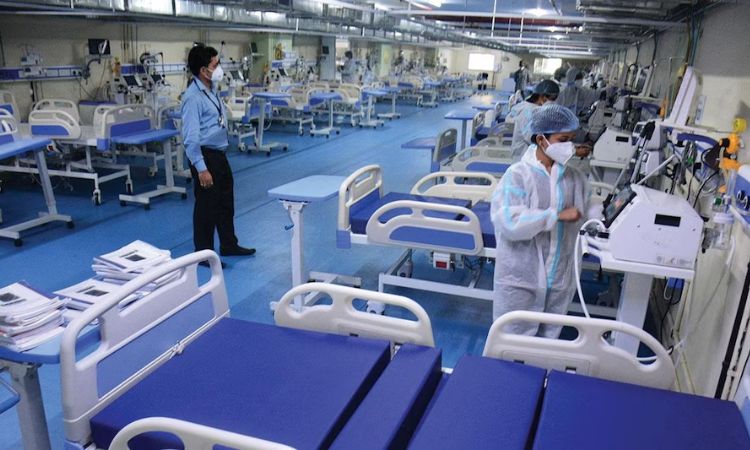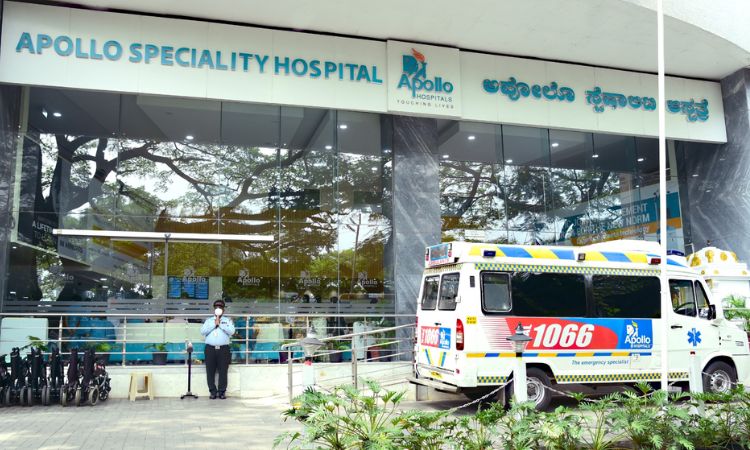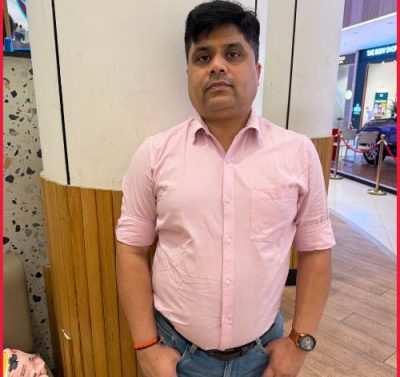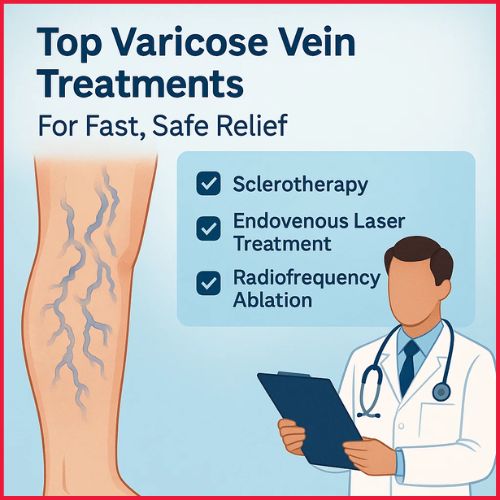Thanks to the pioneering efforts of Apollo Hospitals and Fortis Healthcare, India’s healthcare industry has seen a tremendous shift. These prestigious institutions have not only revolutionized medical services, but have also recruited top talent, set new standards in comprehensive treatment, and played an important part in creating the country’s healthcare scene.
India’s healthcare industry is positioned to thrive, offering modern medical solutions and improving the lives of millions of people, thanks to their unrelenting dedication to quality and the backing of government initiatives.

The Evolution of India’s Healthcare Industry since Independence
Health and education are key cornerstones of society as well as fundamental civic rights. The Bhore Committee delivered a report a year before our independence that formed the blueprint for India’s healthcare system.
It advocated for the creation of Primary Health Centres (PHCs), Secondary Health Centres (SHCs), and District Hospitals. The goal was to offer both preventative and curative treatment. PHCs with a population of 40,000 people and supported by physicians, nurses, midwives, and other support workers were proposed.
States that followed these guidelines outperformed in terms of healthcare delivery, boosting important health metrics such as life expectancy and maternity and newborn mortality rates. However, discrepancies persist across the country and require immediate correction.
In the 1980s, India witnessed the emergence of the private sector in healthcare. Dr Prathap Reddy’s establishment of the first Apollo Hospital in Chennai marked a significant turning point. With state-of-the-art infrastructure and medical expertise comparable to global standards, Apollo attracted top medical talent from India and abroad. The expansion of Apollo to Hyderabad and New Delhi further enhanced access to quality healthcare.
Dr Naresh Trehan, a young cardiovascular surgeon in New York, returned from the United States about the same time to create the Escorts Heart and Research Institute in cooperation with the Escorts organization.
These forerunners in private healthcare paved the path for others, like Narayana, Fortis, Max, Manipal, and Medanta, to create tertiary and quaternary multispecialty centers. The expansion of the private healthcare sector drew top medical talent from both local and foreign sources, resulting in a reverse brain drain.
Government Initiatives: Boosting the Indian Healthcare Market
The rising incidence of lifestyle-related illnesses, increasing demand for cost-effective healthcare delivery systems due to rising medical expenses, advances in technology, the emergence of telemedicine, rapid health insurance penetration, and government initiatives such as e-health, along with tax benefits and incentives, are driving the Indian healthcare market.

- The hospital industry in India was valued at $61.79 billion in FY17 and is projected to reach $132 billion by 2023, with a compound annual growth rate (CAGR) of 16%-17%.
- The Telemedicine market presents significant potential in India’s eHealth sector, expected to reach $5.4 billion by 2025, growing at a CAGR of 31%.
- The National Digital Health Blueprint has the potential to unlock over $200 billion of incremental economic value for the healthcare industry in India within the next 10 years.
- India is home to the world’s largest Health Insurance Scheme, Ayushman Bharat, supported by the government.
- Significant investments have been made in Medical Education in India, with INR 17,691.08 crore invested in 157 newly approved Medical Colleges since 2014.
Apollo Hospitals: Transforming Indian Healthcare with Global Standards
Apollo Hospital, currently known as the city’s most prosperous and powerful hospital, was supposedly founded when a patient of the founder died in 1971 owing to his failure to acquire the funds necessary for a trip to the United States for surgery.
Dr Prathap C Reddy (then at HM Hospital, Chennai) dreamed of a hospital where Indians could receive care on par with the top hospitals in the world in order to avert a similar sad repetition.

He was able to accomplish his ambition more than a decade later. In 1984, Apollo Hospital, India’s first corporate hospital, opened its doors on Greams Road in Chennai.
Chennai was the ideal area for medical practice at the time, having established a reputation for offering high-quality medical treatment at reasonable prices, with over 400 hospitals and four highly recognized medical institutions on the region. Public investment on health infrastructure was at an all-time high.
People had earned faith in private nursing facilities established by prominent doctors. With its principles and professional ethics, the Adyar Cancer Institute, Sankara Nethralaya, and other facilities helped to make Chennai the healthcare capital of India.
Apollo Hospital took timid first steps in this potential healthcare environment, armed with its founder’s resolve to deliver high-tech treatment with a human touch. Even back then, it had numerous firsts to its name: the government granted permitted it to have more than 30 beds, which was previously reserved for government and charity trust hospitals. It was even credited with reversing the brain drain of exceptional medical talent, bringing in some of the brightest medical minds.
The belief
It took the hospital five years, some even a decade, to establish itself. As public reputation and trust grew, the hospital began bringing in the greatest medical equipment and technology.
It had obtained ISO:9002 certification by 1998. It subsequently became the first hospital in South India to achieve the British Standards Institution’s ISO 22000 – HACCP recognition. It obtained ISO 14001:2004 certification for its environmental management system (EMS) in 2013.
Apollo Hospital began cautiously expanding, first in Hyderabad in 1988 and then in Delhi over the next decade, even as it started promoting its services in print. Within two decades of its inception, it was designated as a healthcare Superbrand, and it is the only healthcare institution in India to have this distinction to this day. In 2009, the Indian government issued a commemorative stamp commemorating the facility.
Apollo Hospital was not only the first healthcare provider in India to adopt artery stenting, but it also pioneered open-heart procedures and cardiac catheterization. Apollo Pharmaceutical was the first and biggest branded pharmaceutical network in India.
Retaining the top position
As other hospital networks follow Apollo’s model, the pioneer stays the market leader. Because of the strong family connections that unite the founder’s four daughters, each of whom leads a distinct section of the network, the shift to the next generation has been easy.
It is now regarded as one of India’s leading multi-specialty hospitals, having received awards in almost every category in which it operates, including healthcare, food safety, cleanliness, leadership, medical excellence, safety, medical value travel, nursing, training, patient care, employment, insurance, innovation, CSR initiatives, branding, marketing, image building, and online presence, and, most importantly, the use of artificial intelligence. It has received several Asian Hospital Management Awards in various areas.
From a single hospital, the brand has expanded to become one of Asia’s largest and most trusted healthcare companies, with over 10,000 beds divided over 70 hospitals, 3,500 pharmacies, 170 primary care and diagnostic clinics, and 700 telemedicine units dispersed across 13 countries.
Apart from clinical research, webcasts, and collaborative forums, it also provides medical, nursing, and paramedical courses, as well as academic fellowships and titles. It began by digitizing patients’ medical histories for convenient referencing and tracking. Last year, it inaugurated robot-assisted heart surgery, putting it at the forefront of cutting-edge technical research. It has also opened Chennai’s first Proton Therapy Centre.
Fortis Hospitals: Setting Benchmarks in Comprehensive Medical Care
Fortis Healthcare Limited, established in India, is a well-known healthcare delivery organization. Fortis Hospital’s career began with its founding in 2001. Dr. Parvinder Singh created the organization intending to offer world-class healthcare services in India.
Fortis Hospital soon garnered respect for its devotion to quality healthcare under the leadership of Dr. Parvinder Singh. The hospital attempted to bridge the gap between Indian healthcare services and those provided by premier international institutes.
Fortis Hospital grew quickly, building a network of hospitals throughout India. The organization specialized in providing comprehensive medical services that included a wide variety of specializations and super-specialties. The facilities were outfitted with cutting-edge medical infrastructure and equipment to give cutting-edge treatments and procedures.
Fortis Hospital has built a reputation for excellence in medical knowledge, patient care, and clinical outcomes throughout the years. The hospital drew highly competent doctors, surgeons, and healthcare workers from India and throughout the world. It became well-known for its interdisciplinary approach, which brought professionals from diverse sectors together to deliver comprehensive and integrated healthcare treatments.
The belief
Fortis Healthcare has a legacy that has become a model for business excellence. The Fortis Healthcare network of hospitals is closely following Ranbaxy’s aggressive expansion trajectory, having established itself as a top healthcare chain with as many as 26 hospitals (including 11 satellite/heart command centers) in a very short period. Anyone can be astounded by the physicians’ credentials.
These are some of the most well-known figures in the industry, with extensive expertise and limitless research to their credit. Fortis Hospital Mohali, which is on 8.22 acres and is already in its seventh year, is a real torchbearer for similar super-specialized centres of excellence across the country.
Remaining at the Forefront
While a compelling 200 founder workers continue to diligently shepherd the huge, organised team to new heights, several new divisions and rules have been developed to ensure stable, healthy growth. Fortis Hospital Mohali, which began as a heart care centre, is today not just one of India’s most sophisticated cardiac hospitals, but also a well-recognized multispeciality institution with successes in various high-end operations.
Fortis Healthcare has been able to preserve its status as one of the industry’s leading healthcare providers. Its emphasis on clinical quality, patient-centred care, sophisticated infrastructure, research, talent retention, and ethical practices adds to its long-term success and reputation in the healthcare industry.
Conclusion:
In a nutshell, India’s healthcare business has evolved dramatically since independence, with important contributions from both the commercial and public sectors. The emergence of pioneering institutions such as Apollo Hospitals and Fortis Healthcare has paved the road for the country’s high-quality, modern medical services.
These institutes have not only attracted top medical personnel, but have also been critical in reversing the brain drain and bringing back expertise from overseas.
Furthermore, government efforts such as the National Digital Health Blueprint and the Ayushman Bharat Health Insurance Scheme have helped to strengthen India’s healthcare industry. The growing emphasis on telemedicine, technological advancements, and expenditures in medical education have all contributed to the industry’s growth and development.
While there are still issues and discrepancies, the progress achieved in improving healthcare delivery, upgrading infrastructure, and increasing access to excellent treatment is laudable. The future holds enormous opportunities for India’s healthcare business to thrive and improve the lives of millions of people across the country.















